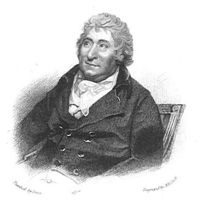Annotation:Dibdin's Fancy
X:1 T:Dibdin's Fancy M:C L:1/8 R:Country Dance Q:"Allegro" B:Thomas Wilson - A Companion to the Ball Room (London, 1816, p. 91) Z:AK/Fiddler's Companion K:G GDGD B,DDD|ECCC c2 AF|GDGD B,DDD|EcAF G2 G2!FIne!:|| dBcd efge|dBAG {^c}d2d2|dBcd efge|dBAG {^c}d2{c}d2!D.C.!||
DIBDIN'S FANCY. English, Country Dance Tune (2/4 time). D Major (Riley, Rook): A Major (Thompson). Standard tuning (fiddle). AABB. Versions appear in print in several publications, including Samuel, Ann & Peter Thompson's Twenty Four Country Dances for the Year 1791 (London), Riley's Flute Melodies, vol. 3 (New York, 1820-25), Carr's Third Book of Elegant Extracts for the German Flute or Violin (Philadelphia, 1798), Wilson's Companion to the Ball Room (London, 1816), Preston's Complete Instructions for the Bassoon (London, c. 1790), and John Young's Vocal and Instrumental Musical Miscellany, No. 1-8 (Philadelphia, 1793). The melody also appears in the John Rook music manuscript collection, Waverton, Cumbria, 1840-1841, the William Mittell ms. (Kent, 1799), and the John Buttery music manuscript. The latter was originally from Lincolnshire and joined the British army as a fifer at the turn of the 19th century. He survived more that 20 years' service and returned home, but later in life emigrated to Ontario, Canada, taking his music ms. with him. Therein the title is given as "Dibdin's Fansey. A Troop," referencing its use as a martial air (a 'troop' was sounded to assemble the men for duty inspection, and guard mount). In America it appears in the music manuscript commonplace book of Jeremiah Brown (Seabrook, New Hampshire, 1782?). The title is a reference to English composer, actor, songwriter and dramatist Charles Dibdin (1745-1814), particularly famous for his sea songs and, in his era, feted as one of England's most popular composers.


